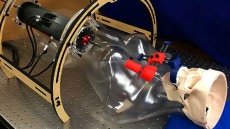NEW YORK - Now that a doctor in New York has been diagnosed with Ebola, health officials are once again stressing that the virus poses little risk in the U.S.
Some questions and answers about Ebola:
WHAT IS EBOLA?
Ebola hemorrhagic fever is a rare and deadly disease caused by a virus that is believed to have originated in African bats. Symptoms can start with fever, muscle pain and weakness, and progress to bleeding, vomiting, and severe diarrhea that can lead to organ failure and death. There have been dozens of small outbreaks since the illness was first identified in 1976, but largest Ebola epidemic in history broke out this year in West Africa and so far has killed more than 4,800 people there.

HOW IS EBOLA SPREAD?
Experts say people infected with Ebola are contagious only when they are showing symptoms. It spreads through direct contact with an Ebola patient's blood or other bodily fluids like urine, saliva, semen and sweat. Those fluids must have an entry point, like a cut or scrape, or the mouth, nose or eyes. In a similar manner, people in West Africa have been infected through contact with dead bodies as part of burial preparations.
HOW IS IT TREATED?
Since there's no specific treatment, care is focused on easing symptoms to give the body enough time to fight off an infection. Patients are given fluids, nutrients and medicines to counter the fluid loss. Experimental treatments have been tried on several patients, but it's not clear how much of a difference they've made.

CAN I CATCH IT ON THE SUBWAY?
Not likely. Experts say it cannot be spread in the air by sneezing or coughing. The highest concentration of virus is thought to be in blood, vomit and diarrhea. So there's little risk of catching the virus from someone on the subway, in an elevator, or on the street. Experts point to the first Ebola illness ever diagnosed in the United States — a Liberian man who became sick while visiting Dallas. He was living with four other people in an apartment when he first became ill and none of them has come down with the illness.
WHAT HAPPENED IN NEW YORK?
A New York physician, Dr. Craig Spencer, had been working as medical volunteer treating patients in Guinea. He returned to the New York Oct. 17, and came down with a fever and symptoms Thursday. He is in isolation in New York's Bellevue Hospital Center. His fiancee is in quarantine at the hospital, and two friends are in voluntary quarantine. Spencer is the fifth U.S. medical aid worker infected in West Africa and treated in the United States. But the others were diagnosed in West Africa, evacuated to the United States and taken directly to specialized isolation units. Spencer's infection wasn't discovered until he'd been back several days.

CAN THE SPREAD OF EBOLA BE STOPPED?
Yes, by isolating everyone with symptoms while testing is done, using proper protective equipment and other precautions while caring for them, and tracking down anyone they were in close contact with when they got sick. Those who have had direct contact with an Ebola patient are advised to take their temperature twice a day for three weeks, the incubation period for the disease. If they show symptoms, they should then be isolated and tested. Ebola is not a





